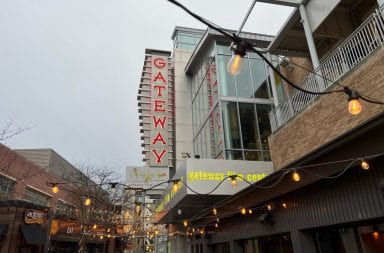It’s not too often that music blares from the sound system before a professor’s lecture. But this was the case when Nick Spitzer delivered his talk, “Roots to Routes: Conservation and Creolization in American Vernacular Music,” at 4:30 p.m. Oct. 12 in the Wexner Center’s Film/Video Theatre.
The lecture, co-sponsored by Ohio State’s Center for Folklore Studies and the School of Music, is the first in an Autumn Quarter series entitled “Lectures in Musicology.”
Before an audience of about 70, Spitzer strolled onto the stage, waved his notes in the air, and placed them behind the podium. As he began to speak, he neared the edge of the stage and rarely glanced back.
“How many of you have seen my radio show?” he asked. All but a few hands shot into the air.
A professor of American studies and communication at Tulane University, Spitzer is also the producer and host of “American Routes,” a public radio program celebrating its 10th year on the air. The two-hour weekly show, which airs in Columbus 9 p.m. Fridays on 90.5 WCBE, examines the relationships between genres of music. His lecture explored a similar subject.
“They do say that professors always give one class no matter what it’s called,” Spitzer said.
The talk went beyond surface-level generalities, however. It delved into Creole culture in post-Katrina New Orleans.
“I will be talking about the Creolization of music and more broadly than that, the idea that new music is made out of old parts of American popular culture,” Spitzer said before his lecture.
He also focused on two metaphors for culture: roots and routes. “R-o-o-t-s refers to culture, usually one place on the land; one ethnic group; one culture group. Over time, they’ve dug roots into the soil,” Spitzer said. “That’s a metaphor we use for the continuity of culture.
“R-o-u-t-e-s is more about mobility. It’s about traveling. It’s about motion,” he said. “We follow people not just in terms of the deep traditions they carry, the r-o-o-t-s, but also the transformed traditions that make up American popular music.”
Spitzer said he believes a creative tension exists between the two. “It’s a balance of those two forces … we present music that deals with that balance, that creative tension,” he said. “For years we talked only about r-o-o-t-s … but now we talk more about what happens when cultures collide with one another. That’s a very American story to tell.”
Spitzer experienced the “American story” firsthand when he traveled the country after graduation from the University of Pennsylvania. “The old tradition was to make your big trip, you know, see America,” he said.
When he finally landed in Louisiana, he said he felt compelled to tell the stories of its cultures. “It wasn’t a plan I had. I followed my heart and my passions.”
During his presentation at the Wexner Center, his passion for culture and music was evident. He bobbed his head to sound clips and adopted animated speech and gestures when his voice mingled with background music.
And he wasn’t the only one expressing enjoyment. Sharon Watkins, a high school music teacher who studies folk music as a hobby, bounced her knee with the beat, scribbled down song titles and nodded at Spitzer’s remarks.
“Something that really caught my interest … was the artistic response to Katrina,” Watkins said. I try to talk to my students all the time about how they can respond to history, so I love it when I can find something in their lifetime.”
Watkins listens to Spitzer’s radio show and hopes to come to the remaining lectures in the series.
The next speaker to present a lecture is Dr. Lois Rosow, professor of music and head of the musicology area at OSU. Her lecture, “Charpentier’s Dancing Magnificat: H.73 as Passacaille,” is scheduled for 4:30 p.m. Monday, Oct. 27 at the Music and Dance Library in Sullivant Hall.
Rosow said her talk targets faculty and graduate students in musicology. “I’m working on a late 17th century French composer named Marc-Antoine Charpentier, and in particular, my lecture concerns a piece of music that he wrote for a church service in one of the large churches in Paris.
“What interests me about it, in particular, is that it borrows some stylistic features from a particular type of theatrical dance called the passacaille,” she said.
Rosow’s lecture is an extension of her work on an article of related material.
The final speaker in the series is Dr. Udo Will, associate professor in the OSU School of Music. He will present his lecture “Music-Language-Link – More Than Analogies?” at 4:30 p.m. Monday, Nov. 9 at the Music and Dance Library in Sullivant Hall.
Will and two of his doctoral students will present research in the field of cognitive ethnomusicology.
“In this discipline, the connection between music and language is one of the topics of interest,” Will said. “Our research is actually to inquire about what are the deeper links.”
The research stemmed from study of surrogate languages, methods of communicating through the spoken language without speaking. “People play melodies on instruments, and by playing these melodies, they transmit messages, verbal messages,” Will said.
“The idea was maybe the tune, the pitch of the melody actually activates the verbal memory,” he said. “And that would mean it’s not just a convention, so not just people agreed upon a certain melody means something, but it is much more refined.”
Will, like Spitzer, will examine the subject through various cultural perspectives.


